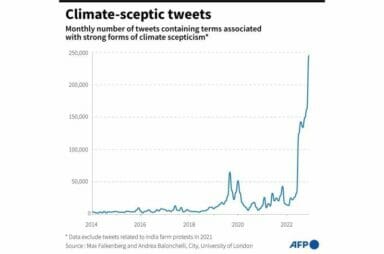Sign up to receive our weekly newsletter
When it comes to disinformation, from elections to climate, arguably no megaphone has been louder and more influential than FOX, owned by Rupert Murdoch. This week it was revealed that FOX hosts, including Tucker Carlson, Sean Hannity, and Laura Ingraham, knowingly spread lies about the 2020 US presidential election for the sake of ratings, according to documents from a $1.6 billion defamation lawsuit filed by Dominion Voting Systems against the network.
Murdoch testified under oath that television personalities at FOX “endorsed” Donald Trump’s lie that the election was stolen even though they knew that Joe Biden fairly won the vote. “[T]he Dominion Voting Systems defamation lawsuit shows how deeply threatened the network is by flimsy, fringe competitors and how executives and hosts talked themselves into dishonestly pandering to viewers to keep ratings and profits up,” writes The Bulwark’s Amanda Carpenter.
The network’s strategic spread of misinformation isn’t isolated to elections. Nearly every day FOX and the climate deniers it platforms spread “misinformation and false narratives aimed at tanking efforts to address the climate crisis,” writes Allison Fisher at Media Matters. This ranges from the broad lie that human-caused climate change is not heating our planet to the specific conspiracy theory that wind turbines are killing whales.
While FOX is a primary driver of climate disinformation, it’s not alone. Over the last year, the use of terms like “climate hoax” and “climate scam” has surged online. The language and tactics are reminiscent of Big Oil’s early propaganda campaigns decades ago to deny the reality of climate change and “reposition global warming as theory (not fact).”
FOX’s spread of these lies undermines legitimate news organizations’ efforts to inform the public on the scientifically agreed upon facts of climate change. It also leads news organizations to spend precious resources chasing false narratives, including the recent fake controversy that the US government planned to ban gas stoves. This is not journalism, but it’s what journalism is up against in the disinformation age, and it’s confusing audiences and damaging society’s ability to act on climate change in time. Research shows that the more we hear something, the more likely we are to think it’s true, even if we’re presented with facts that correct the record.
While the problem is titanic, journalists are not without the tools to do something about it. This includes employing a few common sense journalistic practices to avoid spreading dis- and misinformation: Avoid false equivalences. Be skeptical of fishy claims and sources. If you must report on a lie, don’t repeat it in the headline. And always check your facts. When you absolutely must report on a lie, serve up a “truth sandwich,” a strategy proposed by UC Berkeley linguistics professor George Lakoff, who studies propaganda. The recipe: To counter disinformation, state the truth; then refer to the lie, including that it’s untrue, and finally, repeat the truth.
Tackling disinformation will take major effort on the part of governments, companies, and citizens, but journalism also has a critical role to play in stopping its spread. Let’s stay up-to-date on the disinformation being rampantly circulated so we can warn audiences against it and set the record straight.
From Us
Press Briefing. Three experts on the Biden administration’s new climate policy — Lori Lodes, executive director of Clean Power; Jigar Shah, director of the Energy Department’s Loan Programs Office; and Peggy Shepard, executive director of WE ACT — will brief journalists on the roll-out of the Inflation Reduction Act. March 16. RSVP.
Awards. CCNow is accepting submissions from journalists around the world for the 2023 Covering Climate Now Journalism Awards. Please share with your friends and colleagues! The deadline for submissions is March 15. Learn more.
Noteworthy Stories
On notice. At the opening of the UN Human Rights Council, UN Secretary-General António Guterres called for legal challenges against “climate-wrecking” organizations, including fossil-fuel companies and their financial backers. “[P]ursuing mega-profits when so many people are losing their lives and rights, now and in the future, is totally unacceptable,” he said. By Jamey Keaten at the Associated Press…
Farm Bill. The US Congress has started debating the nation’s agriculture, nutrition, conservation, and forestry policies. The package, called the Farm Bill, is re-evaluated roughly every five years. Some members of Congress are emphasizing the importance of addressing rising emissions in the agriculture sector, which has been battered by extreme weather, while others want to exclude climate measures. By Georgina Gustin at Inside Climate News…
- Drought in the West and forest management are seen as major priorities in this Farm Bill, according to reporting by Axios…
Protest forests. A number of world environmental leaders are meeting in Gabon for the One Forest Summit to discuss how to protect the world’s rainforests, considered a critical climate change solution. Financing is a key issue, following disagreements over who will pay to protect forests at last year’s COP15. Read it at Radio France Internationale…
Bottlenecks. New solar and wind projects are surging in the US but face a major obstacle: connecting these new sources of electricity to homes and businesses. The backlog of projects is leading to years of delays, and some developers are abandoning projects, which could compromise America’s climate goals. By Brad Plumer at The New York Times…
Big Oil–funded research. Six fossil fuel companies gave over $700 million in research funding to 27 US universities from 2010-2020, according to a new study by the think tank Data for Progress and the nonprofit group Fossil-Free Research. Funding universities conducting climate research can skew research in ways that favor the fossil fuel industry. By Amy Westervelt at the Guardian…
Chart of the Week
In a recent story on climate disinformation, AFP charts a rise in climate skepticism on Twitter.
Industry News
EBU study. The European Broadcasting Union’s new report on climate journalism offers advice for newsrooms. It includes case studies from various news outlets — including AFP, Deutsche Welle, the Financial Times, the Weather Group, and more — as well as Q&As from climate reporting experts. Check it out.
Media Matters study. A new study by Media Matters finds that corporate broadcast TV networks in the US spent about 23 hours covering climate last year, about the same as the “high water mark” that the networks achieved in 2021, but still “woefully inadequate.” Topics that remain undercovered include accountability and climate justice. Read it here.
Events
Climate solutions. The Samuel Lawrence Foundation will hold a webinar with Mark Z. Jacobson, Stanford University professor and author of the new book, “No Miracles Needed” and Ken Cook, president of the non-profit Environmental Working Group, to discuss how the technologies needed to solve climate change are available now. March 3. Join the webinar at 11:30 AM Pacific Standard Time here.
Aspen Ideas. The Aspen Institute is hosting a three-day event, “Aspen Ideas: Climate 2023,” in Miami, Florida, featuring conversations with policymakers, activists, artists, innovators, and scientific experts. A number of conversations from the event will be streamed free online. March 6-9. Learn more and sign-up for the livestream.
Film festival. The Pulitzer Center is screening documentaries focused on climate change and work, and hosting a Q&A with contributing journalists, in Washington, DC. The films were produced by Scientific American, the Financial Times, PBS NewsHour, TIME, Anchorage Daily News, and The Seattle Times. March 23. RSVP.
Jobs, Etc.
Jobs. Grist is looking for a staff writer. Mountain State Spotlight is recruiting an environment & energy reporter. Alaska Public Media is hiring a climate change reporter.
Award. The John B. Oakes Award for Distinguished Environmental Journalism, which carries a $5,000 prize, is accepting submissions. The submission deadline is April 29. Learn more.

